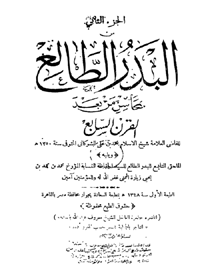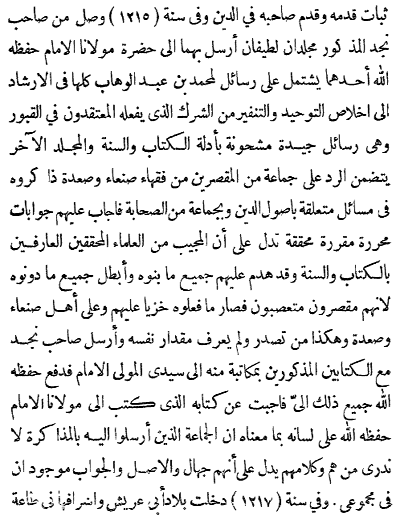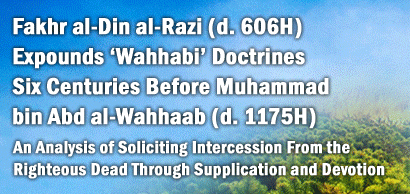 |
You are here:
Home  History
History
Imam al-Shawkani (d. 1250H) on the Writings, Da'wah and Adversaries of Shaykh Muhammad Bin Abd Al-Wahhaab
Posted by Abu.Iyaad, Editor in History
Topics:
Al-Shawkani
|
 |

 He is Muhammad bin Ali bin Muhammad bin Abd Allaah al-Shawkani, then al-San'ani. He was born in 1173H. He memorized the Qur'an and many other texts at a young age, before he reached ten years of age. He then sought knowledge from the scholars and also showed great interest in history and literature. By the time he reached twenty, he was giving fatwa and was also involved in thirteen lessons daily, either taking knowledge from Mashayikh, or delivering to students. In 1209H, the most senior muftee passed away as a result of which al-Shawkani was offered the position by the ruler, however he excused himself because he was occupied with knowledge. However, the ruler said that being involved with both things (knowledge and iftaa) is possible. Al-Shawkani took up the position and this led to truth and justice, and he tackled oppression, removed bribery, and countered the bigotry and partisanship that was found amongst the people, and invited them to follow the Qur'an and the Sunnah. He authored numerous works in fiqh, tafsir, and siyar (biographies). He passed away in 1250H (1834CE). He is Muhammad bin Ali bin Muhammad bin Abd Allaah al-Shawkani, then al-San'ani. He was born in 1173H. He memorized the Qur'an and many other texts at a young age, before he reached ten years of age. He then sought knowledge from the scholars and also showed great interest in history and literature. By the time he reached twenty, he was giving fatwa and was also involved in thirteen lessons daily, either taking knowledge from Mashayikh, or delivering to students. In 1209H, the most senior muftee passed away as a result of which al-Shawkani was offered the position by the ruler, however he excused himself because he was occupied with knowledge. However, the ruler said that being involved with both things (knowledge and iftaa) is possible. Al-Shawkani took up the position and this led to truth and justice, and he tackled oppression, removed bribery, and countered the bigotry and partisanship that was found amongst the people, and invited them to follow the Qur'an and the Sunnah. He authored numerous works in fiqh, tafsir, and siyar (biographies). He passed away in 1250H (1834CE).
We are going to take a look here at a short passage in one of his works, al-Badr al-Tali' (Cairo, 1348H) in which he makes some remarks about receiving the writings of Shaykh Muhammad bin Abd al-Wahhaab and what he thinks of them and of the adversaries and disputants to Shaykh Muhammad bin Abd al-Wahhaab. He said (2/7):
 And in the year 1215H I received from the aforementioned person from Najd two light volumes which he sent to our respected leader, the Imaam (may Allaah preserve him). One of them contained the treatises of Muhammad bin Abd al-Wahhaab, all of them were about directing to sincerity in Tawhid and warning from Shirk which is practised by those believing in the graves. And these are beneficial treatises, filled with evidences from the Book and the Sunnah. And the other volume comprised a refutation of a group of negligent ones from the jurists of San'aa and Sa'dah, they corresponded on some issues with him (Muhammad bin Abd al-Wahhaab) connected to the foundations of the religion (aqidah) and a group from the Companions, so he responded to them with detailed, corroborating, verified responses indicating that the one responding is from the bona fide Scholars, knowledgeable of the Book and the Sunnah, and he destroyed everything they constructed (in argument) and invalidate everything they compiled, because they are negligent, biased partisans, and thus what they did became a humiliation for them and upon the people of San'aa and Sa'dah. Thus is the case of whoever put himself forward and did not know the true worth of his own self.... And in the year 1215H I received from the aforementioned person from Najd two light volumes which he sent to our respected leader, the Imaam (may Allaah preserve him). One of them contained the treatises of Muhammad bin Abd al-Wahhaab, all of them were about directing to sincerity in Tawhid and warning from Shirk which is practised by those believing in the graves. And these are beneficial treatises, filled with evidences from the Book and the Sunnah. And the other volume comprised a refutation of a group of negligent ones from the jurists of San'aa and Sa'dah, they corresponded on some issues with him (Muhammad bin Abd al-Wahhaab) connected to the foundations of the religion (aqidah) and a group from the Companions, so he responded to them with detailed, corroborating, verified responses indicating that the one responding is from the bona fide Scholars, knowledgeable of the Book and the Sunnah, and he destroyed everything they constructed (in argument) and invalidate everything they compiled, because they are negligent, biased partisans, and thus what they did became a humiliation for them and upon the people of San'aa and Sa'dah. Thus is the case of whoever put himself forward and did not know the true worth of his own self....
The reality is that Shaykh Muhammad bin Abd al-Wahhaab brought nothing new from himself. All he did was to start calling and inviting the people to the Tawhid of the Messengers and he was preceded by many others in the matter of preventing the soliciting of intercession from others besides Allaah through direct invocation of them, and preventing the worshipping and veneration of the graves for that same reason. This as we have established is spoken of by the likes of Ibn Aqil al-Hanbali (d. 513H), and Ibn al-Jawzee (d. 597H), and Fakhr al-Din al-Razi (d. 606H), and al-Maqrizi (d. 845H), centuries before Ibn Abd al-Wahhaab was even born.
Link to this article: Show:
HTML Link •
Full Link •
Short Link
Share or Bookmark this page: You will need to have an account with the selected service in order to post links or bookmark this page.







|
|
|
Related Articles:
Add a Comment
You must be registered and logged in to comment.
|
 |




|
 |
 History
History



 He is Muhammad bin Ali bin Muhammad bin Abd Allaah
He is Muhammad bin Ali bin Muhammad bin Abd Allaah  And in the year 1215H I received from the aforementioned person from Najd two light volumes which he sent to our respected leader, the Imaam (may Allaah preserve him). One of them contained the treatises of Muhammad bin Abd al-Wahhaab, all of them were about directing to sincerity in Tawhid and warning from Shirk which is practised by those believing in the graves. And these are beneficial treatises, filled with evidences from the Book and the Sunnah. And the other volume comprised a refutation of a group of negligent ones from the jurists of San'aa and Sa'dah, they corresponded on some issues with him (Muhammad bin Abd al-Wahhaab) connected to the foundations of the religion (
And in the year 1215H I received from the aforementioned person from Najd two light volumes which he sent to our respected leader, the Imaam (may Allaah preserve him). One of them contained the treatises of Muhammad bin Abd al-Wahhaab, all of them were about directing to sincerity in Tawhid and warning from Shirk which is practised by those believing in the graves. And these are beneficial treatises, filled with evidences from the Book and the Sunnah. And the other volume comprised a refutation of a group of negligent ones from the jurists of San'aa and Sa'dah, they corresponded on some issues with him (Muhammad bin Abd al-Wahhaab) connected to the foundations of the religion (








